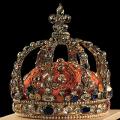410. Ann Blair on Jean Bodin's Natural Philosophy
A chat with Ann Blair about the "Theater of Nature" by Jean Bodin, and other encyclopedic works of natural philosophy. (Pictured: Prof Blair holding the annotated copy of Bodin's Theatrum she describes in the episode.)
Themes:
• A. Grafton and A. Blair, The Transmission of Culture in Early Modern Europe (Philadelphia: 1990).
• A. Blair, “Humanist Methods in Natural Philosophy: the Commonplace Book,” Journal of the History of Ideas 53 (1992), 541-55.
• A. Blair, “Tradition and Innovation in Early Modern Natural Philosophy: Jean Bodin and Jean-Cecile Frey,” Perspectives on Science, Historical, Philosophical, Social 2 (1994), 428-54.
• A. Blair, The Theater of Nature: Jean Bodin and Renaissance Science (Princeton: 1997).
• A. Blair, “The Problemata as a Natural Philosophical Genre,” in A. Grafton and N. Siraisi (eds), Natural Particulars: Nature and the Disciplines in Early Modern Europe (Cambridge MA: 1999), 171-204.
• A. Blair, “Mosaic Physics and the Search for a Pious Natural Philosophy in the Late Renaissance,” Isis 91 (2000), 32-58.
• A. Blair, “La philosophie naturelle dans l’oeuvre de Jean Bodin,” in G.-A. Pérouse et al. (eds), L’oeuvre de Jean Bodin, Actes du colloque tenu à Lyon à l’occasion du quatrième centenaire de sa mort (Paris: 2004), 355-65.
• A. Blair, “Organizations of Knowledge,” in J. Hankins (ed.), Cambridge Companion to Renaissance Philosophy (Cambridge: 2007), 287-303.
• A. Blair, “The Rise of Note-Taking in Early Modern Europe,” Intellectual History Review 20 (2010), 303-16.
• A. Blair, Too Much to Know: Managing Scholarly Information Before the Modern Age (New Haven: 2010).
• A. Blair, “Revisiting Renaissance Encyclopaedism,” in J. König and G. Woolf (eds), Encyclopaedism from Antiquity to the Renaissance (Cambridge: 2013), 377-97.
• A. Blair, “Authorial Strategies in Jean Bodin,” in H.A. Lloyd (ed.), The Reception of Bodin (Leiden: 2013), 137-56.
• A. Blair and K. von Greyerz (eds), Physico-theology: Religion and Science in Europe 1650-1750 (Baltimore: 2020).
• A. Blair et al. (eds), Information: A Historical Companion (Princeton: 2021).







Comments
Add new comment